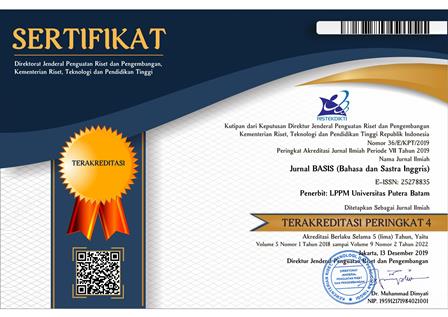CODE SWITCHING FOUND IN RESEARCHERS’ WHATSAPP GROUP “SITADEWIKU”: HOW DOES CODE SWITCHING OCCUR?
DOI:
https://doi.org/10.33884/basisupb.v9i2.6364Keywords:
Code-switching, WhatsApp Group, Researchers.Abstract
This study focuses on the analysis of code-switching of Universitas Mahasaraswati Denpasar’s Synergy of Bird Conservation with Customary Village Community to Promote Demulih Bangli as a Green and Harmonious Virtual Educational Tourism or in Indonesian is Sinergi Konservasi Burung Bersama Desa Adat dalam Mempromosikan Bukit Demulih Bangli sebagai Kawasan Wisata Edukasi Virtual yang Hijau dan Berkicau (henceforth SITADEWIKU) researchers. This study aimed at identifying the types and the function of code-switching on the Universitas Mahasaraswati Denpasar’s researchers WhatsApp group. It was found that 15 text messages show code-switching. The descriptive qualitative method was applied in this research. The types of code switching were analyzed using Romaine's ( 1995))theory, and the function of code-switching was analyzed using the theory of there were three types of code-switching found by the researchers: tag-switching, inter-sentential, and the last one is intra-sentential. The results showed that from 15 data texts the majority of the data used by the members of the research was intra-sentential switching. In terms of function, based on the theory used there were six functions of code-switching from the data above, namely referential function, directive function, expressive function, phatic function, metalinguistic function, and poetic function. The expressive function is the most commonly used function of code-switching found.
References
Adi, W. T. (2018). Code Switching in Critical Eleven Novel. Metathesis: Journal of English Language, Literature, and Teaching, 2(1), 39. https://doi.org/10.31002/metathesis.v2i1.514
Ameliza, T. C., & Ambalegin, A. (2020). Code Switching Analysis in English Literature Whatsapp Group. Jurnal Basis, 7(1), 141. https://doi.org/10.33884/basisupb.v7i1.1837
Appel, R., & Muysken, P. (2006). Language Contact and Bilingualism: Amsterdam Academic Archive. https://doi.org/10.5117/9053568573
Ayeomoni, M. O. (2006). Code-Switching and Code-Mixing: Style of Language Use in Childhood in Yoruba Speech Community. Nordic Journal Of African Studies, 15(1), 90–99.
Chughtai, I. A., Khan, M. A., & Khan, M. R. (2016). Reasons and Contexts to Switch and Mix English by Pakistani Young Learners in Their Native Speech: A Sociolinguistic Study. International Journal of Language and Linguistics, 3(1), 85–94.
Creswell, J. W., & Creswell, J. D. (2018). Mixed Methods Procedures. In Research Defign: Qualitative, Quantitative, and Mixed M ethods Approaches.
Hanafiah, R., Mono, U., & Yusuf, M. (2021). Code-Switching in Lecturer-Students’ Interaction in Thesis Examination: A Case Study in Indonesia. International Journal of Instruction, 14(1), 445–458. https://doi.org/10.29333/IJI.2021.14126A
Hoffmann, C. (1991). An Introduction to Bilingualism. Longman.
Nurmalia, L., & Purwaningrum, P. W. (2019). Code Switching Usage in 50 First Dates Movie. Jurnal Arbitrer, 6(2), 130. https://doi.org/10.25077/ar.6.2.130-136.2019
Rahartri. (2019). “Whatsapp” Media Komunikasi Efektif Masa Kini (Studi Kasus Pada Layanan Jasa Informasi Ilmiah di Kawasan PUSPIPTEK) Pusat Data dan Dokumentasi Ilmiah - Lembaga Ilmu Pengetahuan Indonesia. Visi Pustaka, 21(2), 147–156. https://www.google.com/url?sa=t&source=web&rct=j&url=https://ejournal.perpusnas.go.id/vp/article/download/552/pdf&ved=2ahUKEwiN-4qy7I3qAhXVT30KHYwcB_84ChAWMAh6BAgAEAE&usg=AOvVaw0pDngziXQY2CH474N74V5p
Romaine, S. (1995). Bilingualism. Blackwell.
Sinaga, C. R., & Hutahaean, D. T. (2020). An Analysis of Code Switching Used by Reza Arap on Deddy Corbuzier’s Youtube Channel. JETAFL (Journal of English Teaching as a Foreign Language) ISSN: 2459-9506 An, 6(3), 31–47. http://repository.radenintan.ac.id/10790/1/A THESIS 2.pdf
Trudgill, P. (2003). A Glossary of Sociolinguisti. Oxford University Press.
Williams, C. (2018). Research methods. The Cambridge Handbook of Social Problems, 1(3), 23–37. https://doi.org/10.1017/9781108656184.003

















